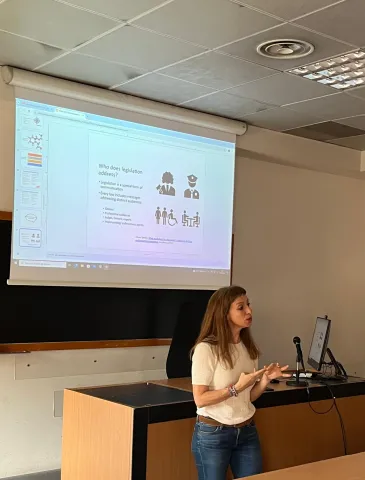
Today, EMLE students had the opportunity of attending the presentation of the book "Gender Sensitive Lawmaking in Theory and Practice" by its author and editor, Professor Maria Mousmouti. This volume, essential for understanding how gender sensitivity can be integrated into the legislative process, offers a comprehensive and multidisciplinary overview of a topic of growing importance.
Professor Mousmouti began by explaining the importance of considering gender in lawmaking. She highlighted that policies and laws impact everyone differently due to distinct needs, situations, and existing structural inequalities. A gender-sensitive approach in lawmaking ensures effectiveness, equality before the law, and the pursuit of gender equality: gender mainstreaming is not (just) a feminist approach.
The presentation delved into various aspects of gender-sensitive lawmaking, starting with the concept of gender-sensitive scrutiny. This involves evaluating how policies and laws affect different genders and identifying potential biases or discriminatory measures. Mousmouti emphasized that gender-blind laws risk not achieving their objectives and may exacerbate gender inequalities.
One key topic covered was the use of gender-sensitive data. Mousmouti explained that disaggregated data reveals different realities for people regarding their gender, helping lawmakers understand the true impact of policies. For example, analyzing data on apprenticeships in traditionally male-dominated fields showed a low take-up by women, highlighting the need for changes to make these opportunities more accessible to both genders.
Another significant point was the importance of gender-neutral or gender-inclusive language in legislation. Mousmouti argued that such language goes beyond symbolism, helping to avoid biased or discriminatory terms and promoting social change and gender equality. The debate was heated and many practical examples of how to implement an inclusive language in various languages were analysed.
The presentation also covered the content and results of laws. Mousmouti provided examples showing how laws shaped around specific gender experiences could lead to exclusion or inequality. For instance, custody laws often result in maternal preference due to prevailing stereotypes, which may not always serve the best interests of the child. A gender-sensitive approach would consider these biases and aim to create more balanced outcomes.
The presentation encouraged EMLE students to think critically about the broader implications of legislative practices. It provided them with essential tools and knowledge to advocate for and implement gender-sensitive laws in their future careers. By understanding the principles of gender-sensitive lawmaking, these aspiring policymakers, lawyers, and economists are better prepared to create laws that promote equality and social progress. By examining real-world examples and theoretical frameworks, students could appreciate how legislation, often perceived as neutral, can have profound and differing impacts on various segments of society. They learned to critically assess existing laws and to think about how future legislation could be designed to promote gender equality actively.
Submitted on Fri, 05/31/2024 - 19:17

